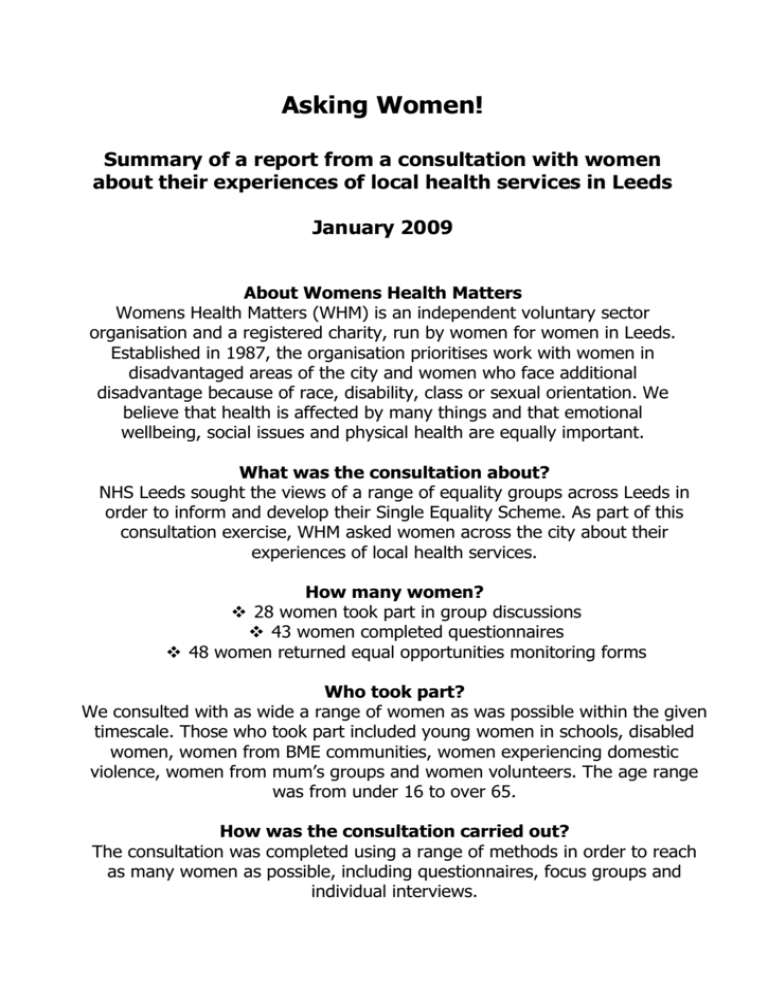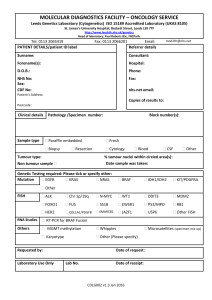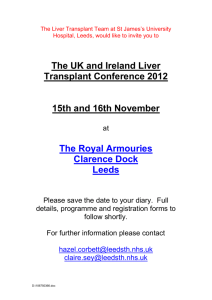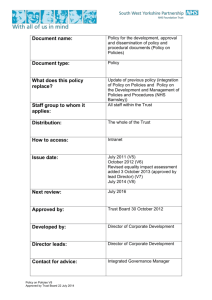Asking Women - Womens Health Matters
advertisement

Asking Women! Summary of a report from a consultation with women about their experiences of local health services in Leeds January 2009 About Womens Health Matters Womens Health Matters (WHM) is an independent voluntary sector organisation and a registered charity, run by women for women in Leeds. Established in 1987, the organisation prioritises work with women in disadvantaged areas of the city and women who face additional disadvantage because of race, disability, class or sexual orientation. We believe that health is affected by many things and that emotional wellbeing, social issues and physical health are equally important. What was the consultation about? NHS Leeds sought the views of a range of equality groups across Leeds in order to inform and develop their Single Equality Scheme. As part of this consultation exercise, WHM asked women across the city about their experiences of local health services. How many women? 28 women took part in group discussions 43 women completed questionnaires 48 women returned equal opportunities monitoring forms Who took part? We consulted with as wide a range of women as was possible within the given timescale. Those who took part included young women in schools, disabled women, women from BME communities, women experiencing domestic violence, women from mum’s groups and women volunteers. The age range was from under 16 to over 65. How was the consultation carried out? The consultation was completed using a range of methods in order to reach as many women as possible, including questionnaires, focus groups and individual interviews. What women told us Experiences of local health services The majority of women had recently used GP services. A wide range of other services were also identified, reflecting the range available, including hospitals, opticians, dentists, clinics, chiropody, occupational therapy, health visitors, pharmacies, midwives and community groups. Positive experiences of these services were strongly linked to clear communication from health practitioners, with proper explanations and good listening skills being highly valued. Negative experiences related to delays and long waiting times, dismissive or patronising attitudes from staff and a lack of access to female health staff within services. Women highlighted several areas for improvement, including the need for specific training around the needs of disabled women, the need for privacy and confidentiality and a need for cultural understanding and respectful and non-judgemental attitudes. Several barriers to access were identified, including a need for language support and interpreters, difficulty in getting convenient appointments, transport issues and the accessibility of some buildings and services. An increase in women-centred services was also seen as being important; many women felt vulnerable in mixed gender environments. Communication and information Women found out about services in a wide range of different ways, such as leaflets, flyers and posters, signposting and referrals from other agencies, NHS Direct, clinics, the internet and directories. Difficulties in finding information were experienced by many women, in particular those who did not speak English as a first language, women with visual impairment or those for whom literacy was an issue. There was also confusion around terminology, in particular in knowing where to look in directories and telephone books. The most positive sources of information were identified as leaflets and personal contact with practitioners, in particular at women’s groups and community organisations where there was the opportunity to ask questions. The majority of women were unsure about how to make a complaint or comment about health services or simply did not know how to go about it. Women also identified several ways to improve information about services, including advertising more widely, providing different formats such as tapes, large print and pictures and using local information points, such as supermarkets. Involvement and consultation The majority of women who took part had never been consulted before or asked for their views on health services. The main barriers to consultation were given as a lack of women’s groups, embarrassment around discussing medical conditions and feeling ignored or patronised by health service staff when making comments or giving opinions. Suggestions for improving involvement included having regular consultations in local venues such as libraries, community buildings and women’s groups, making female staff available and respecting the need for privacy and confidentiality. Lack of feedback from consultations was highlighted as a negative by many women. National Health Service employment Only one woman had ever been employed within the NHS. The reasons given for not considering employment in the NHS included attitudes to disability encountered when using services, difficulties in shift work for women with children or caring responsibilities and a perception of poor working conditions and pay. Changes which might encourage women to apply for jobs in the NHS included better pay and prospects and having access to information sessions on the range of work available, as well as an increase in childcare facilities and a positive attitude to equality. General comments Women raised the following additional points during the consultation process: There should be more choice about treatment and better options More female staff are needed Explanations need to be clear and terminology fully explained Lack of privacy is an important issue for women Patronising attitudes from staff are often encountered, highlighting a training need for health staff Waiting times and delays are commonplace More women’s groups and women-centred services are needed A copy of the full report can be obtained from Womens Health Matters www.womenshealthmatters.org.uk or contact us on 0113 276 2851 or e-mail admin@womenshealthmatters.org.uk for more information on the NHS equality scheme contact 0113 305 7448 or e-mail equalities@nhsleeds.nhs.uk





